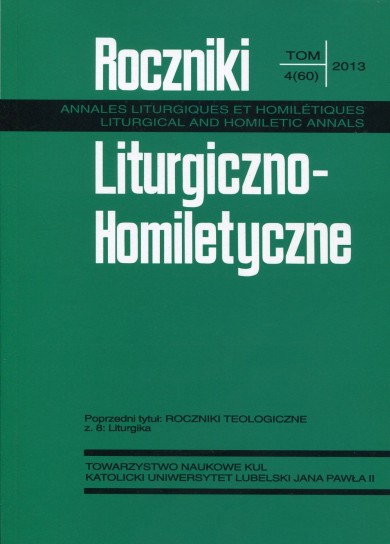Znaczenie terminu „misterium” w refleksji teologiczno-liturgicznej
THE MEANING OF THE TERM MYSTERIUM IN THE THEOLOGICAL-LITURGICAL REFLECTION
Author(s): Ks. Stanisław DykSubject(s): Christian Theology and Religion
Published by: Katolicki Uniwersytet Lubelski Jana Pawła II - Wydział Teologii
Keywords: CHRIST; MYSTERY; LITURGY; HISTORY OF SALVATION; HOMILY; THEOLOGY OF THE LITURGY
Summary/Abstract: The Christian tradition and Liturgy have combined the term mysterium with the event of Jesus Christ. The very concept of mysterium is fairly often translated into Polish as “tajemnica” (“secret,”) therefore it may be taken to mean as some mysterious knowledge, a fact that in relation to Jesus could denote only His teaching not accessible and understandable to all. With this understanding of the term mysterium in mind, Christianity may easily be reduced to a worldview or moral system. It is therefore important to accurately understand the very concept of mysterium and evolution the word has gone through in the theological and liturgical reflection. The term mysterium, derived from Greek culture, was first borrowed by Christianity in as early as the New Testament it served to explain the plans of God’s will and the salvific works of God made in Jesus Christ. In the theology of Church Fathers this term fairly quickly becomes central, be means of which the Fathers defined the whole phenomenon of God’s salvation in Christ and the Church, especially in its acts of worship. They used it also to mark the greatness of God’s works of salvation and their inscrutable character (cf. Eph 3:8). Contemporary theologians and the magisterium of the Church have assumed this concept to illustrate the salvific work of Christ, His proclamation and actualization in the worship of the Church, in the whole activity of the Church, and in Christians’ daily life. Christ’s mysterium and mysteria are not therefore His mysterious teaching, but a salvific work that call for being accepted in faith. Such remarks are especially important for the preacher whose task is to lead the faithful to participation in the salvific mysteria of Christ actualized in the Liturgy, and in the mystic and existential unity with Him.
Journal: Roczniki Liturgiczno-Homiletyczne
- Issue Year: 2009
- Issue No: 1 (56)
- Page Range: 69-85
- Page Count: 17
- Language: Polish

